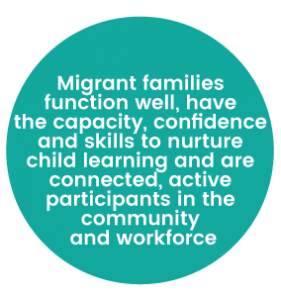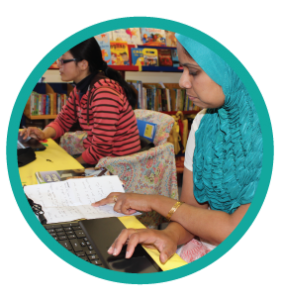Family Outcomes: Improving English Language Skills
Many people coming into our hubs have low levels of English language ability, which affects their confidence and how they communicate with others on a day-to-day basis.
Migrant and refugee women, in particular, can find it difficult to attend classes if they are at home caring for pre-school children. Some have never been to school and therefore have no basic literacy in their own language, making it extremely difficult to learn a new language in a formal educational setting.
Even those people who qualify for and complete government English classes may still require additional help and more opportunities to practice.



Responding to local needs
In the City of Logan, a group of 13 Burmese women needed support to improve their English, however they didn’t want to do any more formal learning.
Most of the women had two or three children and they felt comfortable in the school-based hub environment. They told the hub leader they wanted to learn practical sewing skills.
Once they were sewing, the hub leader, who was also a trained English teacher, started an informal language group.
The women started to enjoy this and found that their confidence with English was improving. They were happy to come in early and extend the time they had to learn English.
They started the day with informal English practice and then continued practicing their new language skills during sewing class.
The classes were not funded. The hub leader facilitated the English classes and students and volunteers provided free child care.
At Westmead Public School Hub, English classes are organised for about 12–16 parents and grandparents of children attending the school.
The classes are led by volunteers led and provide interactive and practical activities with lots of small group and one-on-one activities. They give participants lots of time to practice their English, seek clarification and increase their confidence to speak to and in front of other people. People get help with their pronunciation and understanding Australian accents.
The volunteers are self-sufficient and highly organised. They run the activities with support from the hub leader, who books rooms and organises equipment.
The classes are not funded and there is no child care provided.
A similar model runs in Victoria, with the local AMEP provider (AMES) supplying a volunteer tutor, and the hub leader and parents sharing child minding duties.
A number of hubs in the City of Hume run a 20-week Mother Child English Program in partnership with a registered training provider (RTO).
The curriculum focuses on English within an early childhood development context. The program allows mothers to come in and settle their children into child care in a nearby room, while they have formal English classes that focus on practical, everyday English about child development, pre-school learning, raising healthy children and raising children in a multicultural society. The children take part in fun child care that is pre-accredited.
After the formal session, the children and parents come together in a playgroup, which has play activities themed to the classes, giving parents the chance to practice what they have learned.
The model requires a partnership with an RTO and is suitable for people with various levels of English proficiency. It is funded with AMEP funds as well as funds from the Foundation Skills stream. Funding to cover child care has been sourced from the philanthropic sector.
Find a registered training organisation in your local area and ask them to help you identify funding options for informal and flexible learning; AMEP classes and unlimited access to Foundation Skills training. You may also be able help parents to claim Jobs, Education and Training (JET) child care support to help them attend English classes.
Asking questions such as these will help determine the most appropriate pathway to learning English for each individual:
- What is your reason for wanting to learn more English? (For e.g. for daily communication, to practice existing ability, for work, to be able to study, to build friendships …)
- Have you studied before, in Australia or anywhere else?
- What is your current ability/level of English?
- Do you have a health care card/Visa to study in Australia?
- Do you have pre-school children? (If so) Do you have someone who can take care of them? Are you and your child comfortable separating from each other so you can attend classes?